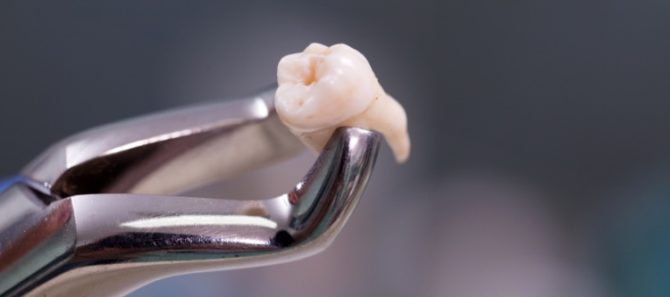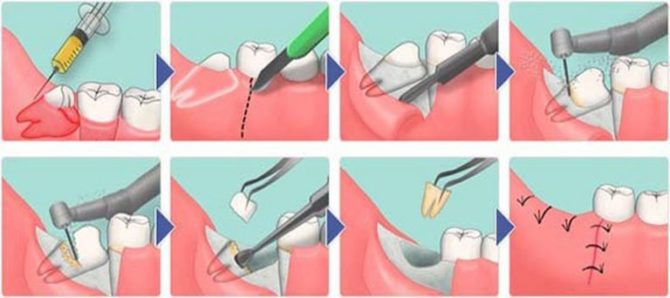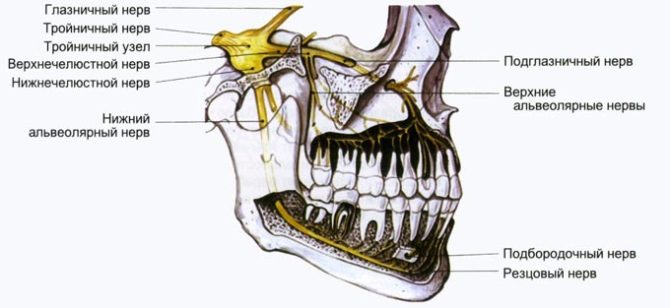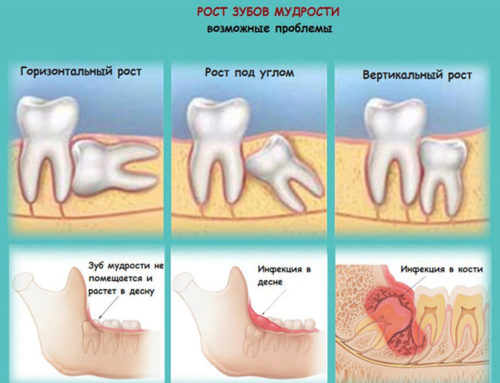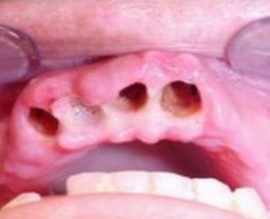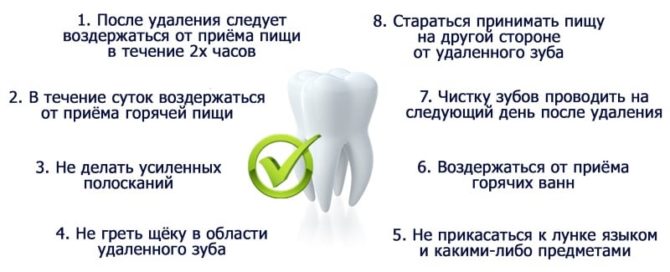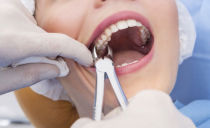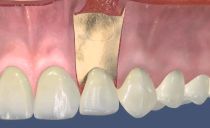Gum hurts after tooth extraction - why and what to do
Today in the arsenal of dentists are the latest equipment, advanced technology, advanced materials. And yet, after some procedures, people experience discomfort. A striking example is extraction, or in another way - tooth extraction. The procedure is painful both in the process and at the end: when a consequence such as aching postoperative pain in the area of the injured gum is manifested.
The doctor should decide what to do if, after tooth extraction, the gum hurts, or other unpleasant symptoms occur. Self-diagnosis can lead to the development of serious complications.
Content
- Simple and complex tooth extraction - differences, symptoms
- How many days does the gum ache after a simple tooth extraction
- How much gum hurts after a difficult wisdom tooth extraction
- Why does the gum hurt after tooth extraction?
- Possible complications after tooth extraction
- How to avoid complications due to the fact that pulled out a tooth
- Gum pain after tooth extraction: how to alleviate the condition at home
Simple and complex tooth extraction - differences, symptoms
If the results of an X-ray examination indicate that the diseased tooth is badly damaged and cannot be treated, the doctor decides to remove it. Extraction is simple and complex. Simple removal is indicated if the operated tooth has smooth, not twisting roots, and the dentist can grab it with dental forceps.
Complex removal is performed if the visible part of the tooth is almost completely destroyed, and the doctor cannot grab it with forceps. In the same way, molars with complex roots are removed, since there is a risk that some of their sections will break off during the operation and remain in the gum.
After a complex operation, often performed when removing wisdom teeth, more unpleasant symptoms occur than with a simple one. The appearance of severe pain, the formation of edema, a fever up to 38 ° C. Such symptomatology is natural, but only if there is a clear tendency to a gradual subsidence of the pain syndrome, subsidence of swelling, resorption of the hematoma, and a decrease in temperature.
Well healing steps
The healing of the hole formed at the site of the torn tooth takes place according to an individual scheme. But we can distinguish the general terms of postoperative recovery. Rehabilitation takes place in 4 stages:
- I stage. Arising on the day the tooth unit is removed, the blood clot condenses. The hole is tightened and heals, swelling of the gums decreases and completely subsides, the throbbing pain passes. The patient returns to his usual way of life: he can chew on the side of the jaw on which the diseased tooth was located and carry out hygienic manipulations. The duration of the stage is 2-3 weeks.
- II stage. It takes approximately 1.5 months. During this period, the restoration of soft gingival tissue continues, the formation of bone tissue begins.
- III stage. The formation of bone tissue in the amount in which it completely replaces the dental roots. The development and strengthening of bone tissue lasts about 4 months.
- IV stage. The fusion of bone tissue formed in the hole with the jaw bone is completed. This stage takes about six months from the moment of visiting the surgeon’s office and tooth extraction.
The number of rehabilitation periods is strictly defined, but the terms that they take may vary.Therefore, it may take some time for someone to fully recover after extraction, and for someone less. On average, tissue repair occurs in six months. If complications arise, the healing process is delayed for 3-4 months.
How many days does the gum ache after a simple tooth extraction
How many days pain will be felt after tooth extraction depends on two main factors:
- localization of the operated dental unit;
- the complexity of the operation.
After a simple tooth extraction, the gums can hurt for 3-5 days. A week after the tooth was pulled out, the pain should completely subside or at least significantly decrease, and the hole should be tightened.
Gum healing may take longer. For example, when removing a completely destroyed molar, when you need to cut the gum to completely remove its roots, or a tooth with a cyst.
How much gum hurts after a difficult wisdom tooth extraction
If stitches are applied to the gum during extraction, it swells and hurts for 5–7 days. Usually, sutures are removed 1 week after surgery. All this time, the patient may feel aching pain and throbbing while eating, talking, brushing his teeth. In the first days after tooth extraction, not only the hole can hurt, but also the neck, ear or temple from the side of the operation.
How many days the pain will last after complex tooth extraction depends on the physiological characteristics of the patient and the anatomical structure of the root system of the pulled out molar. Usually the discomfort is slow, but normal, they can persist for a maximum of two weeks after the removal of the stitches. If the pain persists, go to the doctor.
Why does the gum hurt after tooth extraction?
If, after the doctor has pulled out a tooth, the gums begin to hurt, you should go to the dentistry clinic again to make sure that the symptom is a natural physiological reaction to surgery. Pain in the operated area of the gum may appear due to its infection, therefore, when it occurs, do not self-medicate.
Surgeon error during tooth unit removal
Tooth extraction is carried out in simple cases under local anesthesia, in complex cases under general anesthesia. Therefore, during the operation, you can feel only slight discomfort. After several hours, the effect of anesthesia ceases, and numbness of the soft tissues is replaced by increasing pain, which is the body's natural physiological response to the intervention.
The following defects of the dentist can lead to pathological pain:
- Incorrect deletion strategy
- fragments of a removed tooth remaining in the wound;
- tooth root cutting without cooling;
- errors in prescribing medications for postoperative treatment.
Alveolitis or inflammation of the well
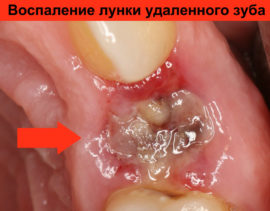 Most often, alveolitis develops after complex removal of a wisdom tooth. Inflammation of the socket due to infection during surgery or as a result of ignoring the recommendations of the dentist regarding nutrition and oral care in the postoperative period.
Most often, alveolitis develops after complex removal of a wisdom tooth. Inflammation of the socket due to infection during surgery or as a result of ignoring the recommendations of the dentist regarding nutrition and oral care in the postoperative period.
Alveolitis is accompanied by pain in the area of the injured gum, its swelling, redness, accumulation of pus in the hole. Possible increase in body temperature and general malaise.
Trigeminal nerve damage during tooth unit removal
Damage to the trigeminal nerve can occur when pulling a tooth from the lower jaw. Pain with such a pathology occurs suddenly and is of a shooting nature. Very often it spreads to the eyes, temples, neck.
Trigeminal branches are shown in the figure:
Wisdom tooth extraction
There are several indications, in the presence of which dentists decide to tear out a wisdom tooth:
- Wrong location.Since the third molar grows at a time when the bone tissue of the jaw is already fully formed, and all other teeth have erupted, there may not be enough room for normal growth. If you do not remove it, it will grow half hidden under the gum, which is fraught with its inflammation, or will begin to put pressure on neighboring molars, destroying them.
- Caries. Because of their poor location, eights are more prone to tooth decay than all other teeth. Very often, cysts form on the roots of third molars.
- Injury to surrounding soft tissue. A wisdom tooth can permanently injure the cheek or tongue, which is fraught with inflammation of the oral mucosa (stomatitis) and even the development of cancer.
The most unpleasant thing in removing a wisdom tooth is that after it there is severe pain. Extraction of the Eight - the procedure is extremely complicated. Very often it is aggravated by the occurrence of negative consequences. The most difficult to remove the upper wisdom teeth, so the postoperative period with this procedure is more difficult.
How many days the gum section on which the wisdom tooth was removed depends on the condition of the molar, its location, the anatomical features, and the condition of the soft gingival tissues around it. To reduce the risk of well-being, you need to follow the doctor’s instructions, and in case of negative symptoms, return to the surgeon’s office as soon as possible for a second examination and necessary assistance.
Possible complications after tooth extraction
If the pain that occurs immediately or a few days after the tooth extraction does not go away and does not subside within three to four days, you should immediately consult a dentist. Persistent swelling of the face, swelling of the gums and jaw, swelling, general weakness, fever lasting longer than two days, ongoing pain, purulent discharge from the wound - all these are symptoms in which you must consult a doctor without fail.
Fine, gum should hurt after tooth extraction for no more than a week. Pain that does not pass longer than the specified period may indicate the development of the following complications:
- "Dry hole." The syndrome occurs due to a loss or leaching of a blood clot from a hole. It leads to an inflammatory process, requires immediate medical attention. The patient may feel unbearable pain and an unpleasant aftertaste in his mouth, complain that his gum has become inflamed and swollen. Treatment consists in thoroughly cleansing the hole, the introduction of antibacterial compounds, applying a bandage.
-
Infection and inflammation of the wound or alveolitis. It may occur due to insufficient processing of the instruments used during the operation, fragments of the tooth remaining in the gum, and bacteria entering the wound. It is characterized by inflammatory and necrotic symptoms: there is acute persistent pain, swelling of the soft tissues of the face, the hole suppurates and becomes cyanotic or black. With this disease, treatment with antibiotics or antiviral drugs is indicated.
- Neuritis or damage to the trigeminal nerve. Trigeminal neuritis occurs due to damage during surgery. The development of the disease is evidenced by shooting pain that pierces the entire face, as well as numbness of the facial tissues and muscles. To alleviate the condition of the patient, painkillers, anti-inflammatory drugs, vitamins and physiotherapy are prescribed.
- Bleeding from a hole. It may occur due to a violation of the postoperative prescription of a doctor, with damage to blood vessels, mechanical trauma, inflammation, the presence of concomitant diseases: hypertension, leukemia, diabetes mellitus. Therapy consists in re-suturing, taking hemostatic agents, applying cold compresses.
How to avoid complications due to the fact that pulled out a tooth
To avoid complications after extraction of a molar or milk tooth, the following recommendations should be followed:
- excessive physical exertion should be avoided;
- it is necessary to periodically apply a cold compress to the operated area of the gum, which helps to reduce soreness;
- you can brush your teeth only on the second day after removal;
- it is forbidden to warm the operated area, take a hot bath, prolonged exposure to direct sunlight;
- in the first three hours after surgery, you can not eat food;
- pain can be relieved with the help of prescribed painkillers;
- Do not touch the hole with your tongue and fingers;
- Observe the doctor's prescription and do not self-medicate.
Anesthetics, which are supposed to be taken to relieve aching pain after tooth extraction, should be prescribed by a doctor. He can also be asked about the possibility of stopping the symptom with the help of pharmacy gels and ointments.
Gum pain after tooth extraction: how to alleviate the condition at home
What to do if after removing the tooth the gum hurts for a long time, the dentist who removed the tooth should decide. Listed below are only general recommendations for eliminating pain.
To remove the pain in the gums that occurred after tooth extraction, you can rinse your mouth with herbal decoctions and infusions about 5-6 times a day and after each meal. For their preparation, it is advisable to use chamomile, oak bark or St. John's wort. Herbs can be brewed individually or in the form of fees. You can make a strong soda-salt solution for rinsing the mouth, which will reduce the risk of infection of the hole.
Rinsing the mouth can only be done after 48 hours after tooth extraction. But even during this period, it is better to replace the procedure with oral baths (holding fluid in the mouth) so as not to damage the blood clot formed in the well.
To speed up the healing process of the hole, you need to eat foods with a high content of vitamins. Cooked dishes should be grated, warm, not injuring the gums and cheeks. Chew food on the healthy side of the jaw. It is strictly forbidden to drink alcohol and smoke, eat acidic, spicy, solid and hot food.
Follow the healing process of the hole. With a simple tooth extraction, the pain should not last longer than a week. After the wisdom tooth has been removed, the gums can hurt for up to three weeks. But in both cases, there should be a tendency towards a decrease in the pain syndrome, and there should be no additional signs of complications: bleeding, fever, weakness, lethargy, dizziness, discharge of pus from the hole, bad breath.
Natural postoperative pain can be relieved with the help of analgesics - Analgin, Ketanov, No-shpa, Nurofen, Diclofenac. Pills reduce soreness, but they can only anesthetize the gums once - in order to avoid complications and side effects, the choice of anesthetic medication for continuous use should be agreed with the doctor.
At the slightest suspicion of complications, it is urgent to consult a doctor. Listen to the advice of the dentist, monitor the condition of the hole - and then you do not have to treat alveolitis or, even worse, osteomyelitis - inflammation of the jaw bone.

